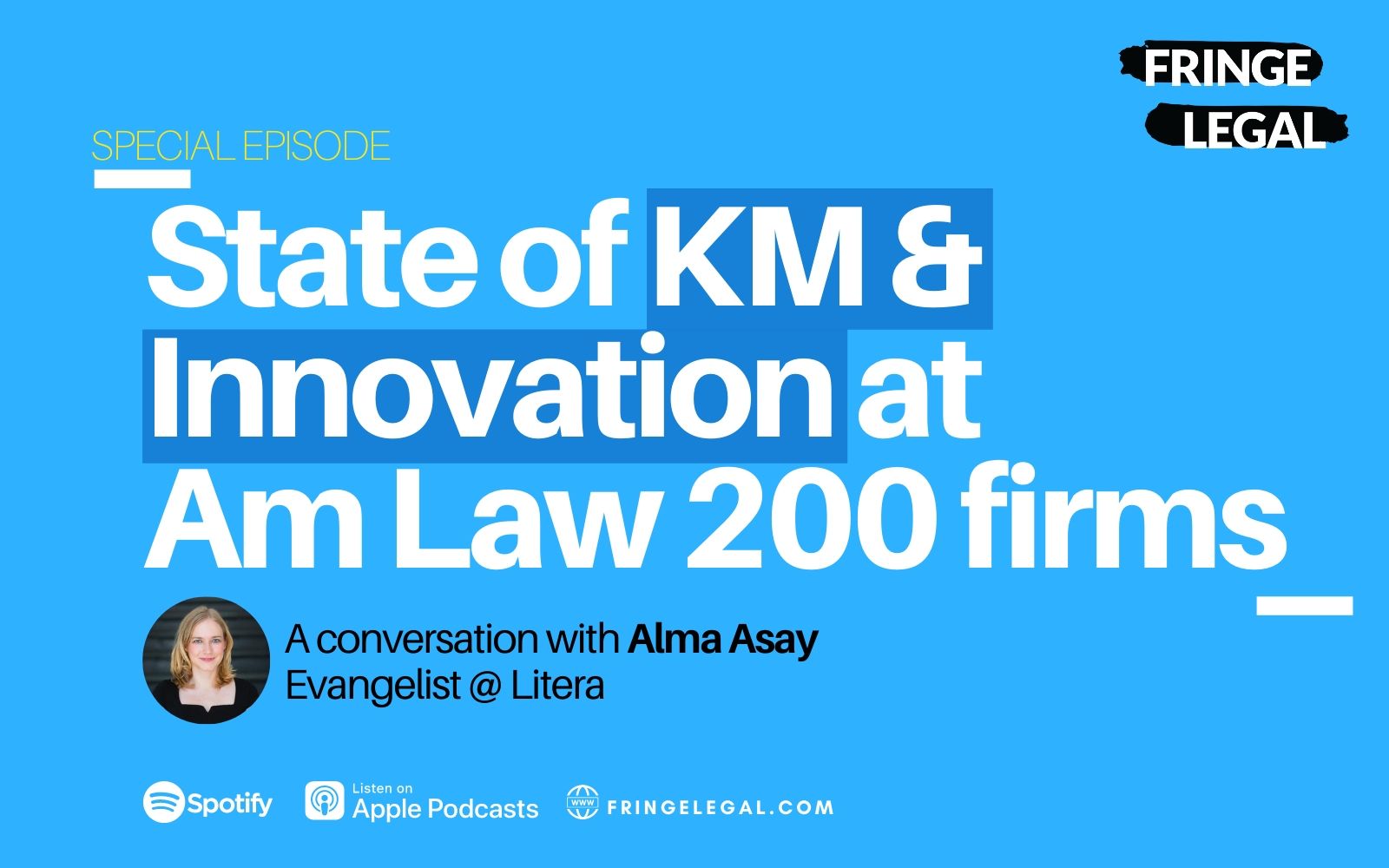Fringe Legal - Innovation at Am Law 200 firms / Stan Garfield on KM Maturity / The Sandman audio drama
Jul 20, 2020 7:39 am
Hi ,
Here are five things that were worth sharing this week:
1. Think
There is plenty of complexity in the world. Sometimes things are complicated; in other instances, they are presented in such a way to make them appear complicated.
One of the core concepts in computer science is Abstraction. This is the act of representing essential information without including background details and explanations.
A real-world example is making coffee using a coffee machine (think one of those Nespresso machines). You simply provide the water and the pod. You don't need to know how the machine works, the water's ideal temperature, or even how much ground coffee is being used. Someone abstracted all of that and provided you with a simple interface that requires no knowledge of the internal implementation.
I think the concept can be readily applied just as well to drafting documents, speaking, providing training, designing your product as well as it can to coding. I would wager that you've experienced this at some point. The easiest way to observe this is to listen to an expert explain a complex topic to a layperson. One of two things will happen:
- they will abstract the concept, sharing just what's necessary. This allows the idea to be understood without the background details. (analogies are extremely useful in doing this). Or,
- they will leave the layperson baffled and confused (perhaps more so than they were previously). Often because they have shared too much of the complex information too soon.
I stumbled across this great post by Jesse Duffield, which provides a beginner's guide to Abstraction. (N.B. if you're not a developer, feel free to skip the code examples).
The way I define it is that the verb 'abstract' is to attempt to reduce complexity by combining repeated commonality into some generalisation. And so, the noun 'abstraction' is the result of that attempt. If you're somebody who believes Abstraction is by definition a successful attempt, feel free to substitute the term 'wrong abstraction' with 'failure to abstract' throughout this post.
Abstracting ideas (like code) seems to be a tricky proposition. You need to have enough data and confidence that what you're abstracting needs to be abstracted, and it's based on what is more than mere coincidences.
You will not be right every time, but what is important is to note (mentally or otherwise) what is contributing to that decision.
As Jesse points out 'your job is to get good at making the right bets.'
Further pondering
- When explaining a concept, drafting a document/guide, or designing get used to asking yourself whether the Abstraction makes things more or less complicated.
- Get into the habit of noting the factors that lead to a decision as you're making the decision. You'll be amazed at how often we add in additional information that didn't exist initially when we recount or defend our decisions.
2. LISTEN
How do you think the Am Law 200 firms are doing with focusing on Knowledge Management and Innovation? In this special episode, I speak with Alma Asay, who gives us a state of the union of who's doing well, and where the gaps are.
In Am Law 200 only 12 firms have Chief Innovation Officers and 11 of those are in the first 100 block. Only 19 have Chief Knowledge Management officers, and 17 of those are in the top 100 block.
In terms of anybody with an innovation title in the Am Law 200, there are only 175 people on LinkedIn with innovation in their title. And 148 of those are in the top 100.
As an exclusive for newsletter subscribers only I wanted to share the transcript to the episode also (note that it is mostly auto generated so excuse any missteps). I know some of you prefer to read rather than listen, and I hope this serves you well.
This is linked to the audio so you can play from anywhere in the text, and see things that I've highlighted as useful. Enjoy!
Find the transcript and audio here
3. WATCH
This past Friday, I spoke with KM Expert and Leader Stan Garfield. I'm in awe of the extensive knowledge that Stan has, and during the 30-minute chat, we barely scratched the surface.
We covered what KM means for Stan, advice for those just starting the KM initiative, and how to sustain it to maturity. Stan also provided details of some things he's applied in past roles which have worked well (such as setting up the "KM Stars" program).
Lot's of great information here. For newsletter subscribers, I'm working on a write up to this conversation and will share soon.
4. FUN
The Sandman by Neil Gaiman was first published in 1989. Since it's release, it could only be enjoyed as a graphic novel (published by DC), that is, until now. I've never read the graphic novel, but it's been recommended to me many times.
Audible has just released The Sandman as an audio drama. So far I've listened to the first hour, and I'm hooked! It is beautifully narrated and acted and masterfully produced. I can't wait to continue listening. It's $15.99 or one Audible credit. Here's a short description to whet your appetite:
When an occultist attempts to capture the physical embodiment of Death in a bargain for eternal life, he instead mistakenly traps Death's younger brother Morpheus, the King of Dreams. After his seventy-year imprisonment and eventual escape, Morpheus goes on a quest to reclaim his lost objects of power and rebuild his realm. From there, one of the greatest and most successful series of graphic novels ever written begins.
5. COMING UP
It's been a hectic last few weeks, and I've had the privilege to speak with some truly fantastic people. In the next few weeks, I'll be sharing conversations with Andrea Miskolczi, Mick Sheehy, and more.
Thanks for being a part of the journey.
Help us grow: If you know anyone who will enjoy this, please forward this email, or ask them to sign up.
Stay well.
Ab




